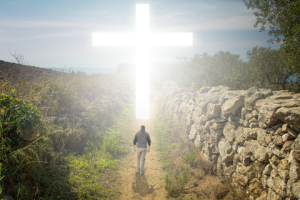Surrender and Sanctification Along the Romans Road
In chapter 12 of Romans Paul shifts from his discussion of the theological basis for faith in Christ, to a more practical discussion of how this faith should be applied in daily living. The ‘therefore’ in verse 1 suggests that what is to follow is based upon what came before. But not only does this verse refer back to the mercy discussed in Romans 11, of God bringing salvation to both Jews and Gentiles, but also to all the mercies throughout the first eleven chapters of Romans. These mercies include those we’ve looked at along the Romans Road: the mercy of God’s redemptive work Christ (Romans 3:23-25); the resulting mercy of the free gift of eternal life (Ro. 6:22-23); the mercy that this gift is available for all who believe in the person and work of Christ (Ro. 10:9-11); and the great mercy of being at peace with God (Romans 5:1).
I appeal to you therefore, brothers, by the mercies of God, to present your bodies as a living sacrifice, holy and acceptable to God, which is your spiritual worship. (Romans 12:1)
In his commentary on the book of Romans, Robert Mounce said, “These ‘mercies’ provide not only the basis, but also the incentive for all moral effort on the part of the Christian.” So, we are to consider ourselves dead to sin but alive to God in Christ. Sin should not have dominion over us (Romans 6:1-14). We are to walk according to the Spirit; not according to the flesh (Romans 8:4).
Greek philosophy often devalued the body. According to John Murray, “The ethical ideal was to be free from the body and its influences.” But this belief runs counter to a Biblical understanding of the importance of our physical nature. The degeneration of the body is the consequence of sin (cf. Genesis 2:17; 3:19; Romans 5:12), but the consummation of redemption anticipates the resurrection of the body (cf. Romans 8:23; 1 Corinthians 15:54-56). So, the renewal of our physical being is an integral part of the redemptive work of Christ. What was Paul trying to say here in Romans 12:1?
In First Corinthians (1 Corinthians 9:24-27), Paul urged Christians to discipline their bodies by self-control in all things. Here in Romans, he said we are to consider ourselves dead to sin but alive to God in Christ. Sin should not have dominion over us (Romans 6:1-14). We are to walk according to the Spirit; not according to the flesh (Romans 8:4). Therefore, we are to present ourselves “to God as instruments of righteousness” (Romans 6:13); or as he said in Romans 12:1, as a living sacrifice.
Paul uses ritual sacrifice here, common in both Jewish and Roman culture, as a conceptual metaphor to introduce how the Christian should live out their faith in Christ. An offering in Old Testament, Jewish ritual or Roman cultic practice was killed; its blood was shed. Paul turns the usual understanding on its head by saying that believers are called to a living sacrifice of their bodies.
Similar to our own time, in Roman culture there was a tendency to minimize or justify certain physical appetites as ‘normal.’ Coupled with the tendency to diminish the importance of the physical body, there was a real danger that some within the Roman church would seek to live a sinful lifestyle because they were under grace (Rom. 6:15ff). Paul was aware that if sanctification did not include the physical aspect of our being, it would be impossible to achieve. So here in chapter 12, he calls for the alignment and renewal of bodily appetites according to the will of God, and declares it to be an act of spiritual worship.
This living sacrifice is clearly voluntary, and suggests that free will has a role to play in sanctification. Surrendering our bodies as living sacrifices is a decision and we could choose to not do. As Robert Mounce noted, “Holiness of life rarely progresses apart from deliberative acts of the will. While sanctification is gradual in the sense that it continues throughout life, each advance depends upon a decision of the will.”
Living Sacrifice in the Third Step
Paul’s appeal to present our lives as living sacrifices to God in Romans 12:1 has a clear recovery parallel within the Third Step of Alcoholics Anonymous, which reads: “Made a decision to turn our will and our lives over to the care of God as we understood Him.” Here we see the same dynamic of a call or decision to turn over the living sacrifice of our will and lives to the care of God, albeit to God as we understood Him. This god is not necessarily the God of Scripture, but the language of surrender in Step Three has an echo of familiarity to the Christian. In an essay he wrote on the Third Step, Bill Wilson said, “It is when we try to make our will conform with God’s that we begin to use it rightly.” If Bill had been referring to the God of Scripture, his comment could have been appropriately applied to the Biblical call to surrender in Romans 12:1.
Using the metaphor of a closed and locked door which opens only to the key of ‘willingness,’ Wilson said that looking through it, we see an inscription beside a pathway which reads: “This is the way to a faith that works.” Faith of some kind, even if it was only in A.A. itself, was possible to anyone. “But faith alone can avail nothing. We can have faith, yet keep God out of our lives.” Wilson added that the effectiveness of the whole A.A. program rested upon “how well and earnestly” the alcoholic worked the Third Step. Even the smallest beginning of willingness was enough. Once the key of willingness was placed in the lock and the door was even slightly open, “we find that we can always open it some more.” Self-will may slam it shut, but “it will always respond the moment we again pick up the key of willingness.”
The program of Narcotics Anonymous believes “Recovery begins with surrender.” It’s Third Step Prayer says, “Take my will and my life. Guide me in my recovery. Show me how to live.” The relief of letting go and letting God helps an addict to develop a life worth living. This surrender gets easier with daily practice. “When we honestly try, it works.” But there is a caution that recognizes this is a living sacrifice: “Although we know that ‘turning it over’ works, we may still take our will and life back.”
Bill Wilson observed that simply by joining A.A., the person had made a beginning on Step Three. “Already a willingness has been achieved to cast out one’s own will and one’s own ideas about the alcohol problem in favor of those suggested by A.A.” But suppose that instinct of self-determination attempts to limit the surrender only to things involving alcohol?
“How persistently we claim the right to decide all by ourselves just what we shall think and just how we shall act.” We are confident that intelligence and willpower can control our inner lives and give us success. This philosophy of playing God sounds good, but it has to meet the acid test: “how well does it actually work?” The alcoholic learned through experience that self-sufficiency did not pay off. “Each of us had his own near-fatal encounter with the juggernaut of self-will, and has suffered enough under its weight to be willing to look for something better.” Circumstances drove them to A.A. where they admitted defeat, acquired the rudiments of faith and are now faced with the decision to turn their will and life over to a Higher Power.
As the Third Step says, we make a decision to turn our will and life over to the care of God; we become a living sacrifice. Sanctification must include our body. Our sacrifice encompasses our whole being: body and soul. For the addict or alcoholic, this alignment and renewal of their bodily appetites with the will of God includes abstinence from all mind altering and mood changing drugs. They must make this surrender.
In his daily devotional, Oswald Chambers said surrender is not the surrender of the external life, but of the will. He said one of a few great crises in life is the surrender of our will to God, who neither crushes it into submission nor pleads with us to surrender it. He waits until we yield our will to Him. According to Chambers, “That battle never needs to be re-fought.” (My Utmost for His Highest, September 13th).
If you’re interested, more articles from this series can be found under the link for “The Romans Road of Recovery.” “A Common Spiritual Path” (01) and “The Romans Road of Recovery” (02) will introduce this series of articles. If you began by reading one that came from the middle or the end of the series, try reading them before reading others. Follow the numerical listing of the articles (i.e., 01, 02, or 1st, 2nd, etc.), if you want to read them in the order they were originally intended. This article is the 14th in the series. Enjoy.


